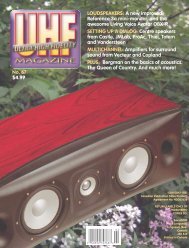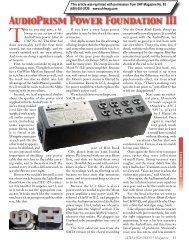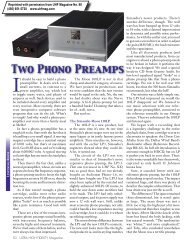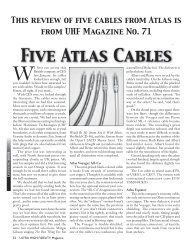A Terrific Tube Preamplifier From Korea, And A - Ultra High Fidelity ...
A Terrific Tube Preamplifier From Korea, And A - Ultra High Fidelity ...
A Terrific Tube Preamplifier From Korea, And A - Ultra High Fidelity ...
You also want an ePaper? Increase the reach of your titles
YUMPU automatically turns print PDFs into web optimized ePapers that Google loves.
painful scenes at home, and after a stressful<br />
period the family broke up. Vasily left<br />
to live with his mother.<br />
It was a drastic break from the life<br />
Sergei had known, its challenge a precursor<br />
of exile later on. The boy drifted,<br />
comforted by a bond with his maternal<br />
grandmother, who apparently spoiled<br />
him. Schooling in preparation for entry<br />
into the St. Petersburg Conservatory<br />
had been arranged, but once there he<br />
began to skip classes, only continuing<br />
to attend musical courses. He doctored<br />
his own report cards. Another beloved<br />
older sister, Yelena, who had a beautiful<br />
contralto voice and was engaged by the<br />
Bolshoi Opera, died of anemia. When<br />
the young Rachmaninoff failed all his<br />
non-musical subjects and risked losing<br />
a scholarship, his mother appealed to<br />
Alexander Siloti, a cousin and former<br />
student of Nikolai Zveref in Moscow.<br />
Sergei’s musical talent was evaluated and<br />
he was sent to Zveref.<br />
Sergei was lucky. Zveref’s home was<br />
an ideal environment for a talented<br />
twelve-year-old in need of structure.<br />
The regime was strict but not draconian:<br />
three hours’ practice daily. Zveref’s<br />
unmarried sister was a female presence.<br />
Zveref had two other resident pupils<br />
who shared the piano room, and nonresident<br />
students as well, including the<br />
young Alexander Scriabin. The boys<br />
practised in shifts, taking turns to get<br />
up and start at 6:30 a.m. Sundays were<br />
open house for Moscow’s musical and<br />
intellectual elite, and Rachmaninoff<br />
played for Tchaikovsky, Arensky and<br />
others, including the great pianist and<br />
composer Anton Rubinstein. Though<br />
Rubinstein’s own playing had no effect<br />
on Sergei at the age of 12, the following<br />
year was a different story. Zveref’s<br />
students attended multiple recitals and<br />
Rachmaninoff was deeply touched. As<br />
late as the 1930’s he wrote with passion<br />
of Rubinstein’s beauty of tone, his “profound,<br />
spiritually refined musicianship,”<br />
and his dictum that the pedal was “the<br />
soul of the piano.”<br />
Rachmaninoff started formal composing<br />
at this time, as part of his education<br />
at the Moscow Conservatory. His<br />
very earliest pieces have mostly not<br />
survived, but there is a Lento in D minor<br />
written as an exercise for Arensky’s<br />
harmony class at the Conservatory,<br />
presumably in 1887. Arensky was pleased<br />
with his harmonization; by 1888 Rachmaninoff<br />
had moved into the “special<br />
theory” stream at his school, the one<br />
for pupils destined to be composers. At<br />
the end of that year he passed his theory<br />
examinations with the highest possible<br />
mark. One of the examiners was Tchaikovsky,<br />
who predicted a great future for<br />
the young man.<br />
Rachmaninoff graduated in May<br />
1892 with the highest possible mark and<br />
in addition, the Moscow Conservatory’s<br />
Great Gold Medal, awarded for only the<br />
third time. His final examination had<br />
been his performance of his own short<br />
opera Aleko, based — like the other<br />
graduates’ works — on a rushed libretto<br />
derived from a Pushkin story. His success<br />
brought him a deal with the music<br />
publisher Gutheil.<br />
It also reconciled him with Zveref,<br />
with whom he had broken at age 16,<br />
perhaps because the teacher had refused<br />
to provide him with a piano room for<br />
composing. On this occasion Zveref gave<br />
him a gold watch. At that time Rachmaninoff<br />
had found a welcome with his<br />
father’s sister Varvara Satin, whose busy<br />
home and four daughters represented a<br />
sharp contrast to the monastic life with<br />
Zveref. This relationship would provide<br />
him with an invitation to the family<br />
estate, Ivanovka, where he spent most<br />
summers for years to come.<br />
During his time at the Moscow<br />
Conservatory, Rachmaninoff composed<br />
intensely. At least one of the early<br />
works, the Russian Rhapsody, formed the<br />
basis of a revised, possibly improved,<br />
version published much later. He also<br />
started work on the First Piano Concerto,<br />
of which the just-completed rewrite<br />
ULTRA HIGH FIDELITY Magazine 65<br />
Software
















